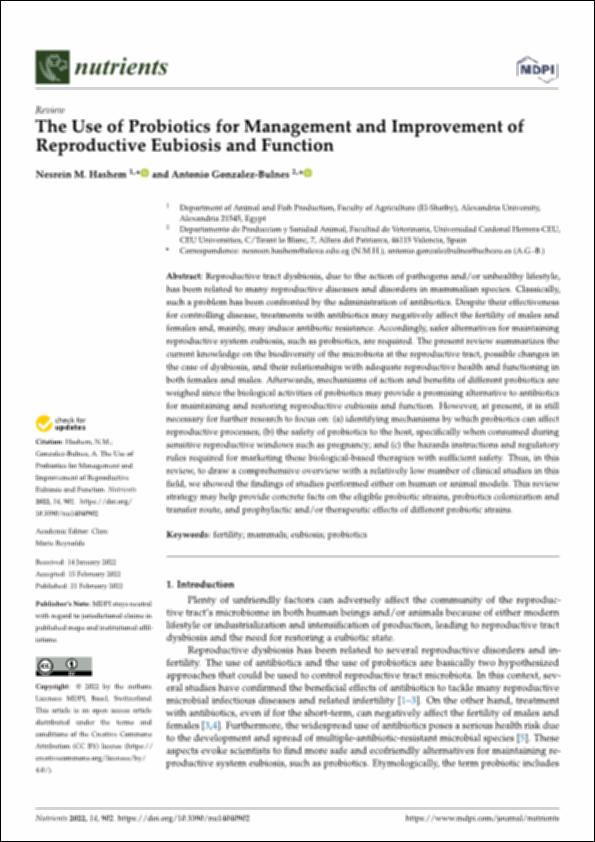Por favor, use este identificador para citar o enlazar este ítem:
http://hdl.handle.net/10637/14281The use of probiotics for management and improvement of reproductive eubiosis and function
| Título : | The use of probiotics for management and improvement of reproductive eubiosis and function |
| Autor : | Hashem, Nesrein M. González de Bulnes López, Antonio |
| Materias: | Antibióticos - Uso terapéutico.; Probióticos - Uso terapéutico.; Mamíferos - Fecundidad.; Antibiotics - Therapeutic use.; Fertility.; Mammals - Fertility.; Probiotics - Therapeutic use.; Fecundidad. |
| Editorial : | MDPI |
| Citación : | Hashem, N. M., & Gonzalez-Bulnes, A. (2022). The use of probiotics for management and improvement of reproductive eubiosis and function. Nutrients, vol. 14, i. 4 (21 feb.), art. 902. DOI: https://doi.org/10.3390/nu14040902 |
| Resumen : | Reproductive tract dysbiosis, due to the action of pathogens and/or unhealthy lifestyle, has been related to many reproductive diseases and disorders in mammalian species. Classically, such a problem has been confronted by the administration of antibiotics. Despite their effectiveness for controlling disease, treatments with antibiotics may negatively affect the fertility of males and females and, mainly, may induce antibiotic resistance. Accordingly, safer alternatives for maintaining reproductive system eubiosis, such as probiotics, are required. The present review summarizes the current knowledge on the biodiversity of the microbiota at the reproductive tract, possible changes in the case of dysbiosis, and their relationships with adequate reproductive health and functioning in both females and males. Afterwards, mechanisms of action and benefits of different probiotics are weighed since the biological activities of probiotics may provide a promising alternative to antibiotics for maintaining and restoring reproductive eubiosis and function. However, at present, it is still necessary for further research to focus on: (a) identifying mechanisms by which probiotics can affect reproductive processes; (b) the safety of probiotics to the host, specifically when consumed during sensitive reproductive windows such as pregnancy; and (c) the hazards instructions and regulatory rules required for marketing these biological-based therapies with sufficient safety. Thus, in this review, to draw a comprehensive overview with a relatively low number of clinical studies in this field, we showed the findings of studies performed either on human or animal models. This review strategy may help provide concrete facts on the eligible probiotic strains, probiotics colonization and transfer route, and prophylactic and/or therapeutic effects of different probiotic strains. |
| Descripción : | Este artículo se encuentra disponible en la siguiente URL: https://www.mdpi.com/2072-6643/14/4/902 Este artículo de investigación pertenece al número especial "Nutrition and Microbiome". |
| URI : | http://hdl.handle.net/10637/14281 |
| Derechos: | http://creativecommons.org/licenses/by/4.0/deed.es |
| ISSN : | 2072-6643 (Electrónico) |
| Idioma: | es |
| Fecha de publicación : | 21-feb-2022 |
| Centro : | Universidad Cardenal Herrera-CEU |
| Aparece en las colecciones: | Dpto. Producción y Sanidad Animal, Salud Pública Veterinaria y Ciencia y Tecnología de los Alimentos |
Los ítems de DSpace están protegidos por copyright, con todos los derechos reservados, a menos que se indique lo contrario.


